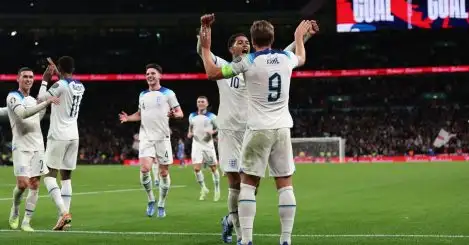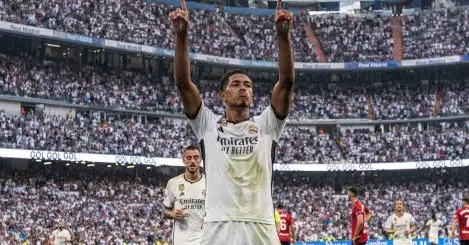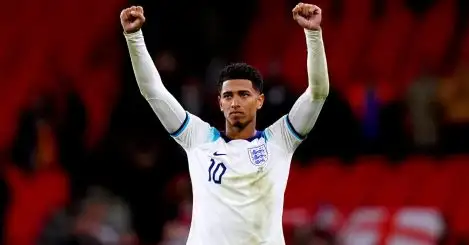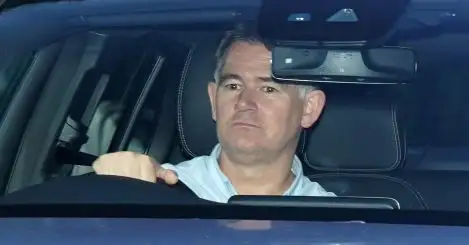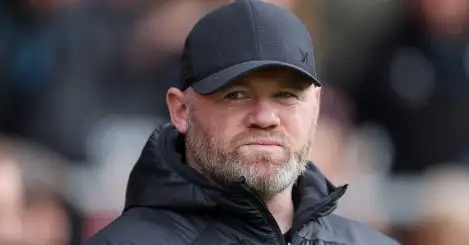Jude Bellingham is the Wayne Rooney of this Golden Generation; will he under-achieve too?
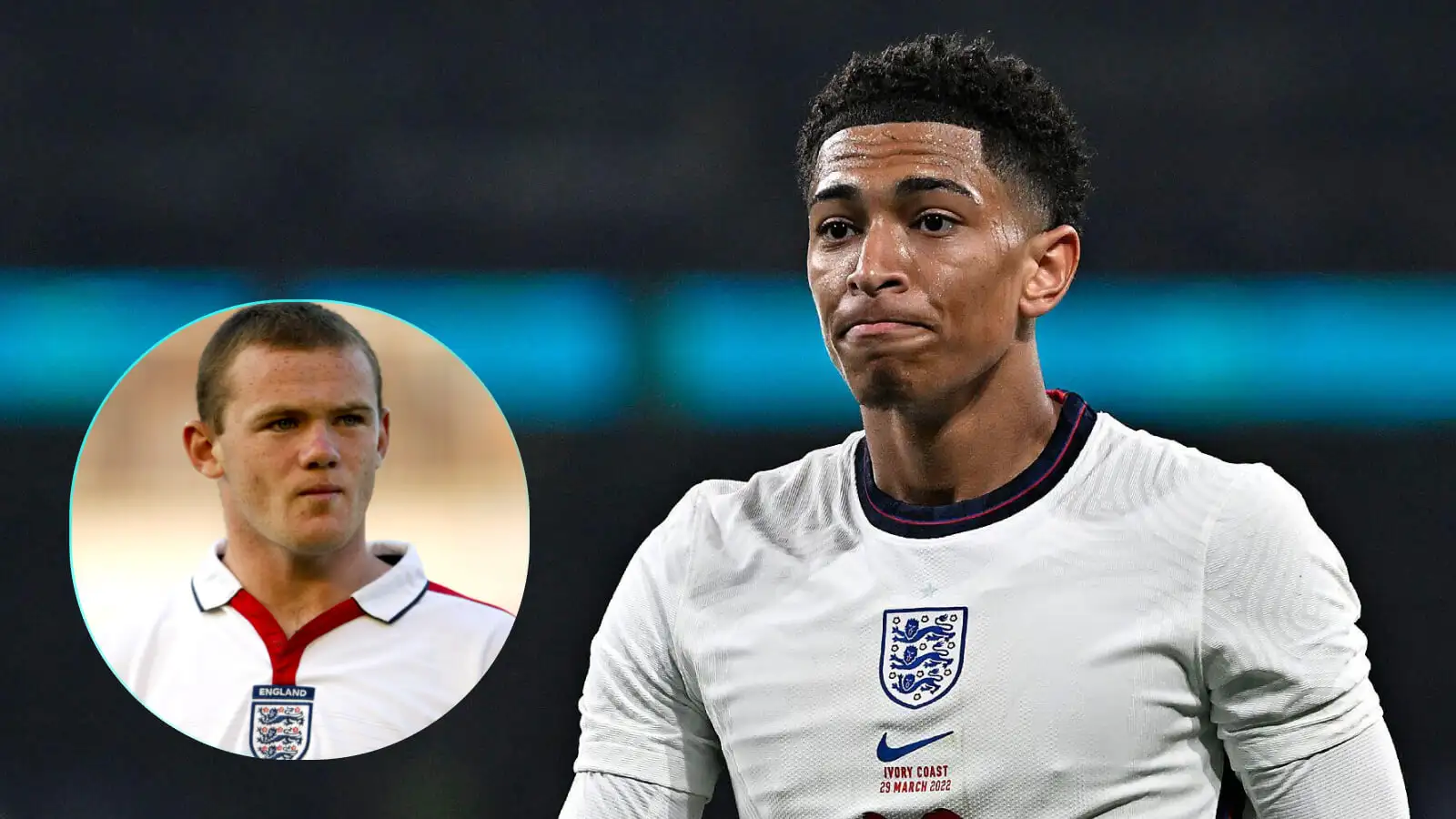
England sealed qualification for Euro 2024 with a 3-1 win over Italy on Tuesday night featuring two Harry Kane goals, but all the chatter was about Jude Bellingham and the idea of him carrying the Three Lions to glory next summer. It is reminiscent of 20 years ago when another young English player had the world talking and made the Euros his own: Wayne Rooney. There are many similarities and parallels between then and now, but also a warning.
There hasn’t been as much hype, and justified hype, around a young talent since Rooney, albeit Bellingham has not just suddenly burst onto the scene – Euro 2024 will be his third tournament, though he was a bit-part player in 2021, only getting off the bench three times.
Those tournaments have all come in unusually quick succession due to a combination of Covid leading to a year-long delay of the Euros and the corruption that led to a preposterous winter World Cup in Qatar.
In more normal times, Rooney’s Everton debut came on the first day of the season following the 2002 World Cup and by the time the next tournament had rolled around, he was the star boy, having become the youngest player to play for England in early 2003 (17 years, 111 days).
That record was later broken by Theo Walcott, who was part of the lost generation between so-called golden generations, while Bellingham sits in third.
Walcott legitimately came from nowhere, extraordinarily being picked for the 2006 World Cup despite not having played a top-flight game, and ahead of Jermain Defoe, while Rooney and Bellingham’s arrival on the international scene had long been predicted and they took it to with ease.
That is one of the many similarities between the players. Unlike Walcott, the two never looked out of place physically amongst players 10 years their senior. While still only boys, both had the build of men.
Like Michael Owen, who has a valid claim to be the best teenager of the modern era, both Rooney and Bellingham also possess(ed) the in-game intelligence, awareness and any other intangible that you can think of that made their transition to the top of senior men’s football so easy. They instantly belonged amongst the world’s best.
As mentioned, both players are at the forefront of much-fabled ‘Golden Generations’ that have many things in common. The timelines may not fully add up given the quick succession of tournaments in recent times, but there are parallels.
Both had lost 2-1 in the previous World Cup to a heavyweight of the game – in 2002 to eventual winners Brazil, in 2022 to defending champions and eventual finalists France. It must also be noted that England had bombed out at Euro 2000 while they made the final in 2021 but the first marked the end of an era, with Alan Shearer and Tony Adams retiring and Kevin Keegan leaving his managerial post.
As for the teams around Rooney and Bellingham, both had a long-term captain playing in a tournament after their first season abroad following years spent with their boyhood clubs. Kane suffered penalty heartbreak against France in the World Cup, while Beckham did similarly against Turkey in qualification and again at Euro 2004 against Les Bleus and Portugal.
Both sides also had question marks in numerous positions across their team despite their overwhelming levels of quality.
At centre-back, Harry Maguire’s position is under threat as he isn’t playing enough for Manchester United but who could replace him? Twenty years ago, the question of who would replace another United defender, Rio Ferdinand, was more pressing given he would not be at the tournament due to a missed drug test.
Back then, England’s depth at the back was perhaps at its strongest ever, with John Terry, Ledley King and Sol Campbell stepping into the breach. It is not quite the same now, though Marc Guehi or Levi Colwill would be in many pundits’ and punters’ line-ups.
The make-up of England’s midfield is both an issue now and then for varied reasons, with Gareth Southgate seemingly insistent on a double pivot (it does allow Bellingham freedom in fairness) but neither Jordan Henderson nor Kalvin Phillips are fit for purpose.
READ: The famous F365 Euro 2024 England ladder: Phillips and Henderson leave us depressed
How the current side could do with an Owen Hargreaves or a Michael Carrick, or even a Nicky Butt. None of these players were deemed fashionable enough in 2004 and Sven Goran Eriksson’s obsession with fitting in his stars saw Paul Scholes play wide left of an all-star diamond featuring Beckham, Steven Gerrard and Frank Lampard.
It would be Euro 2004 that would kick off the debate around those two latter players. For Gerrard-Lampard then, see Phillips-Henderson now rather grimly.
Not a similarity but more of an interesting titbit at left-back – Ashley Cole, the starter at Euro 2004, had his England career ended after Luke Shaw, presumed starter at Euro 2024, was selected ahead of him for the 2014 World Cup.
There is a slight difference at managerial level, with Eriksson fancying himself as a playboy, and Gareth Southgate a defender of the faith or the indefensible in the curious case of Henderson.
Euro 2004 became Rooney’s tournament from the opening game against France when he ran through their defenders until he broke his foot after just 27 minutes of the quarter-final to hosts Portugal with England one up.
It appeared England, under the leadership of the explosive Evertonian, might go all the way, but his absence served as a hammer blow; they eventually lost on penalties, a gloveless Ricardo famously saving from Rooney’s replacement, Darius Vassell.
At the time, it felt as though England would have countless chances at success with Rooney not even in his 20s, but it never happened.
Further injuries saw him arrive at both 2006 and 2010 World Cups nowhere near fit, and coupled with issues elsewhere, saw England achieve little, out in the quarter-final (Rooney sent off) and round of 16 respectively. By 2014, he was not the same player and England were amid a serious downturn, bowing out at the group stages.
As for the tournament in which he announced himself to the world, England did not qualify in 2008 despite the Champions League final of the same year being an all-Premier League affair, he was suspended for the first two games in 2012, and like 2014, his powers were on the wane (excuse the pun) in 2016 as the Three Lions reached their nadir with that loss to Iceland.
Of course, after Euro 2004, Manchester United signed Rooney, and he won the lot at club level but only three more tournament goals would come after his four in Portugal. It is a near-certainty Bellingham will enjoy similar levels of success at Real Madrid, but Rooney’s international career serves as a warning to both him and Gareth Southgate.
England have already come close with the current core group and really should have won the last Euros. This is very likely to be Southgate’s last tournament, might be Kane’s last in his absolute prime and will be Bellingham’s first as a confirmed superstar and star of the team.
If Rooney’s first dance in 2004 and everything after is anything to go by, there is no tomorrow guaranteed in international football. The time is now for England to make the most of their latest, and possibly greatest, star boy.
